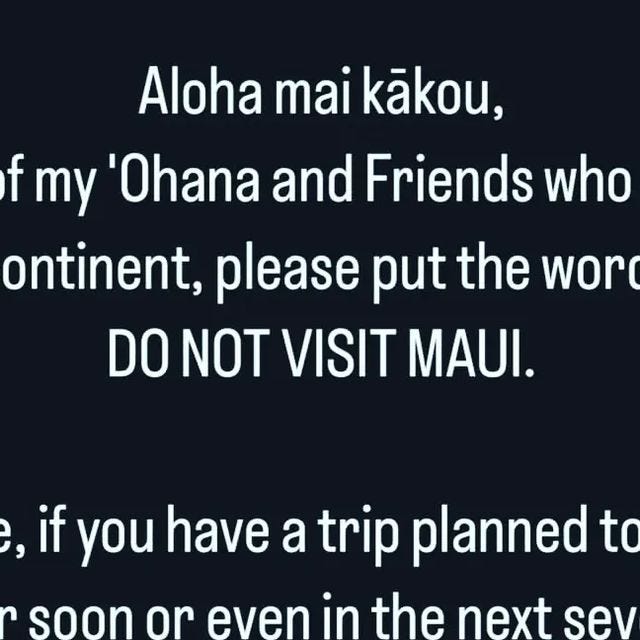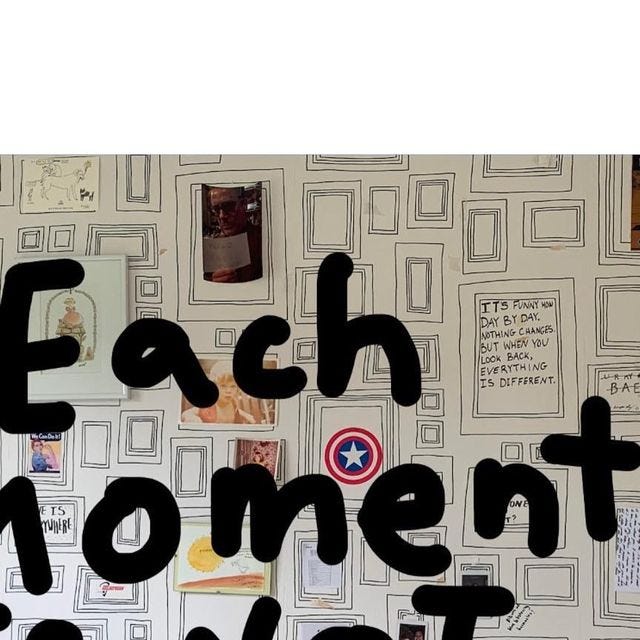Some updates + Maui relief
A pause for paid subscriptions, thoughts on visiting and helping Maui, and more
Hello!
I’m writing to you from Louisiana, where the temperatures continue to break records, and now we have wildfires in the mix. It’s a scary time. This is typically hurricane season here, meaning thunderstorms and heavy rain, not fire. Like Gov. John Bel Edwards said, ‘“Nobody alive in Louisiana has ever seen these conditions.”
For a bit of what we’ve been experiencing, Rick Rojas at the NYT has a piece on how even for the South, this summer is especially sticky (some great anecdotes in here). And my colleague Stephen and I have a piece on the wildfires and ongoing drought. It’s not just here. Southern Europe is also experiencing scorching temperatures, including wildfires in Greece. And of course, there’s Maui. Getting there in a second.
I recently listened to a Longform podcast episode with John Goodell, author of “The Heat Will Kill You First.” It was a great discussion and I’m excited to read the book.
Pausing paid subscriptions
If you’re a paid subscriber, maybe you got an email today telling you that paid subscriptions are paused (I have no idea if Substack sends emails alerting you of this). Thank you SO much for supporting this newsletter. Unfortunately, I have not been able to keep up with regularly posting due to work and life the past few months, and I don’t think it’s fair to be charging you for a sporadic newsletter. I’ve paused paid subscriptions through the end of the year. At that point, I’ll reevaluate and get a plan in place so that if I do bring the paid version back, posting is more on schedule. I have lots of ideas for the paid newsletter, I just want to make sure I have the time to implement them, and right now my full-time job is taking most of my time.
That doesn’t mean the newsletter is going anywhere. I have guides to Door County; a post on what, exactly, is ‘American’ food; thoughts on the best places for your first trip outside of Europe; what bananas can tell us about the world; and much more coming soon. This is just an acknowledgement that it’s going to arrive in your inbox whenever I have time to put it together. Hopefully twice a month. But, maybe not. We’ll see! Thanks again for your support. 💛
Maui
Wildfires in Maui gripped the world’s attention this month. Recovery will take time and thoughtfulness.
As Keolu Fox wrote in Science:
As a Native Hawaiian, I have seen the state experience several catastrophes only to have residents wonder if the next crisis will be worse. For decades, Hawaiians have warned of the islands’ vulnerability to natural disasters and human-induced stresses—from volcanic eruptions and hurricanes to a resource-consuming tourist industry that drains water tables. Yet, recovery efforts have given priority to the status quo. The devastation in Maui warrants serious changes in economic activities and infrastructures across Hawai‘i to prevent such a tragedy from happening again.
He goes on to list suggestions for restructuring tourism (with a more eco-minded approach, like Bhutan or the Galapagos), reducing emissions, and placing Indigenous people in leadership positions.
Over-tourism has long been an issue in Hawaii. That doesn’t mean people shouldn’t ever go. I spoke with Kainoa Daines and Annie Daly about how to be a better traveler if you do visit. But for now, you should not visit Maui.
“We don’t want to be seeing people on vacation when we’re trying to pull our lives back together. We don’t want our roads closed because tourists can’t follow directions. If you’re a tourist, don’t come to Lahaina. I don’t care if you have reservations, now is not the time. Go someplace else, please,” said West Maui councilwoman Tamara Paltin on a Facebook Live video.
Hawaii’s Governor Josh Green has said 500 hotel rooms will be made available for displaced locals, and 500 set aside for aid workers from FEMA. He is also working with Airbnb to make rental homes available for locals who lost their homes. This is not the time to get in the way.
“To understand these fires, you have to rewind to the 19th century, when Christian missionaries transformed an area that was mostly wetlands into large-scale sugar plantations that required the digging of tunnels and the building of reservoirs to divert water to mills and away from sustainable agriculture. Dominated by American investors, the sugar and pineapple industries led to deforestation and left native Hawaiians with insufficient water for their crops,” writes Yarmiar Bonilla in the New York Times.
Civil Eats put it simply:
“The catastrophic fire that just ravaged more than 2,000 acres and at least 2,000 homes on Maui, and claimed 114 lives and counting is inextricably linked to the island’s agricultural history.”
An interview with Noa Lincoln, an assistant professor of Indigenous crops and cropping systems at the University of Hawaii, Manoa, goes deeper into issues of water diversion, deforestation, and Big Ag’s impact on Maui. (Highly recommend reading the whole thing).
All this to say, if you’ve ever visited Hawaii, benefited from its beautiful beaches or delicious food, or are planning to do so in the future, you owe it to the islands to give back.
Here are some places you can donate:
Maui Times. This is run by someone at Gambit, a New Orleans-based publication under the same ownership as the newspaper I work at. In the aftermath of Hurricane Katrina, the staff of the Maui Times raised money for the staff of Gambit. Now, the Maui Times staff is suffering––many have lost their homes––while continuing to cover the fires and their community. “A vigilant local press will be needed if an equitable reconstruction that respects the rights of Lahaina’s indigenous people and culture is to occur.” You could also subscribe to the paper.
Coincidentally, Nathan and I were planning to visit Maui in September. We’re going to Martinique and St. Lucia instead. Have you been? Any recommendations?
Lots of Links
The fight for the right to trespass: A group of English activists want to legally enshrine the “right to roam” — and spread the idea that nature is a common good.
Stop trying to have the perfect vacation. You’re ruining everyone else’s.
Eater’s college dining package was fun! A lot of great places here. But they got the ‘best creamery’ wrong. Babcock Dairy Hall at UW-Madison is obviously the best campus creamery! (We are, after all, the Dairy State).
A climate warning from the cradle of civilization (with some beautiful scrollytelling)
Not to scare you, but, airline close calls happen much more than previously known.
How hip hop conquered the world
Gen Z are the stingiest tippers. I think a shift needs to happen with tipping in the U.S. and how we pay people a living wage. But until that happens, not tipping is not ok.
The agony and excess of the state fair
What is wrong with people? ⤵️
This is how the U.S. is treating Afghan allies who helped us
How four countries are preparing to bring stolen treasures home
What “The Bear” gets right about Chicago ❤️
And related: Americans are very, very thirsty. Drinking water is hard to come by in Europe, apparently. (I found this hilarious).
My parents let my brothers and me draw on our walls as kids. So naturally, I love this wallpaper:
And finally, AOC on why U.S. sunscreen is so bad! (I’ve mentioned it before, but I love Skin Aqua).
Ok, thanks again for reading! Hope you have a great week ahead and can’t wait to share Martinique and many other tips with you in the coming months.
–Rebecca 💛











The ability to pause paid subscriptions is a great provision with Substack.